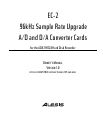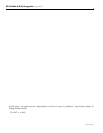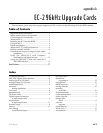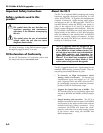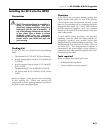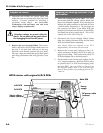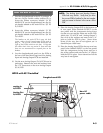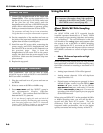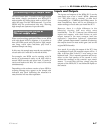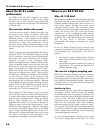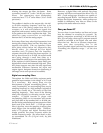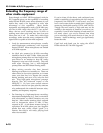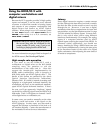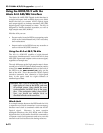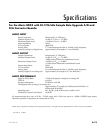
EC-2 96kHz A/D/D/A upgrade • appendix A
A-12 EC-2 Manual
Using the HD24/EC-2 with the
Alesis AI-4 AES/EBU Interface
The Alesis AI-4 AES/EBU Digital Audio Interface is
a single-rack space unit available from your Alesis
dealer that lets you connect ADAT Optical input
and output signals to industry-standard AES/EBU
digital signals, eight channels at a time. The AI-4 is
designed to handle standard operation, as well as
high sample rates (88.2/96kHz).
With the AI-4 you can:
• Export tracks from the HD24 to mastering units
(such as the Alesis MasterLink), DAT recorders,
and workstations
• Import tracks to the HD24 from any recorder or
source with an AES/EBU interface.
Using the AI-4 at 88.2/96 kHz
The AI-4 is ALWAYS capable of eight-channel
conversion, simultaneously—each of the AI-4’s four
AES/EBU inputs and outputs carries a stereo signal,
regardless of sample rate.
The only difference at the high sample rates is that a
second pair of ADAT Optical cables must be used to
connect the ADAT OPTICAL 9-16 jacks on the back of
the HD24 to the ADAT OPTICAL (5-8) jacks on the
back of the AI-4. This is because the ADAT Optical
interface transmits four channels of high-speed
data, in the space used for eight channels of
standard-speed data.
Remember that if you’re transferring more than
eight tracks at a time to the HD24, and must
do multiple passes, there should be some
synchronization via ADAT Sync at the same
time. If the workstation doesn’t have ADAT
Sync, you should use multiple AI-4s to
download all tracks at the same time.
Word clock
In a simple transfer between the HD24 and the AI-4,
a separate word clock connection is not necessary,
because word clock is contained within the ADAT
Optical signal. However, in more complex
multipath situations, the AI-4, HD24, and all other
digital devices in the studio should be connected to
a separate word clock generator and set to use this
external word clock source as the timing reference.



